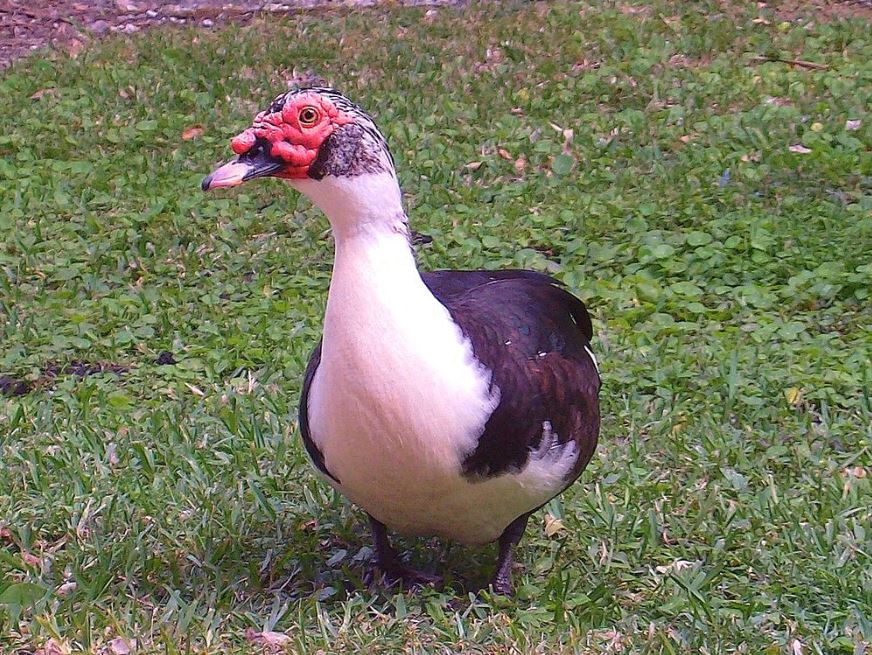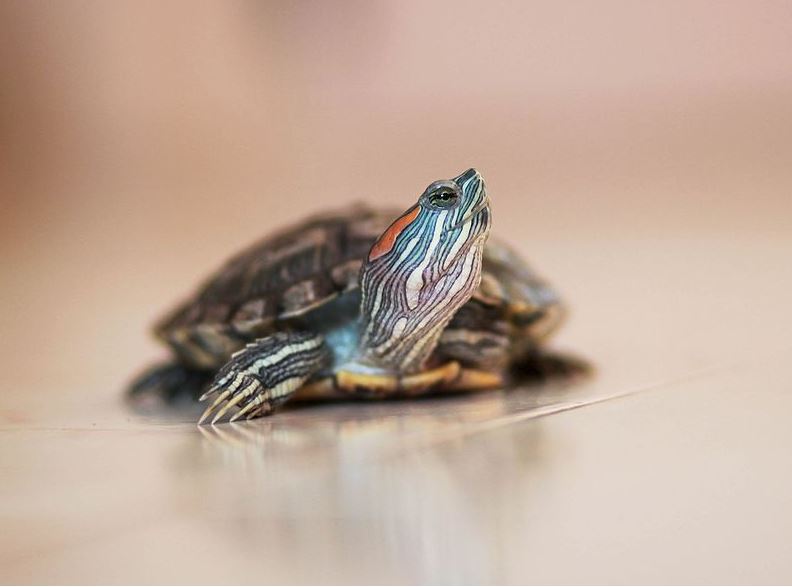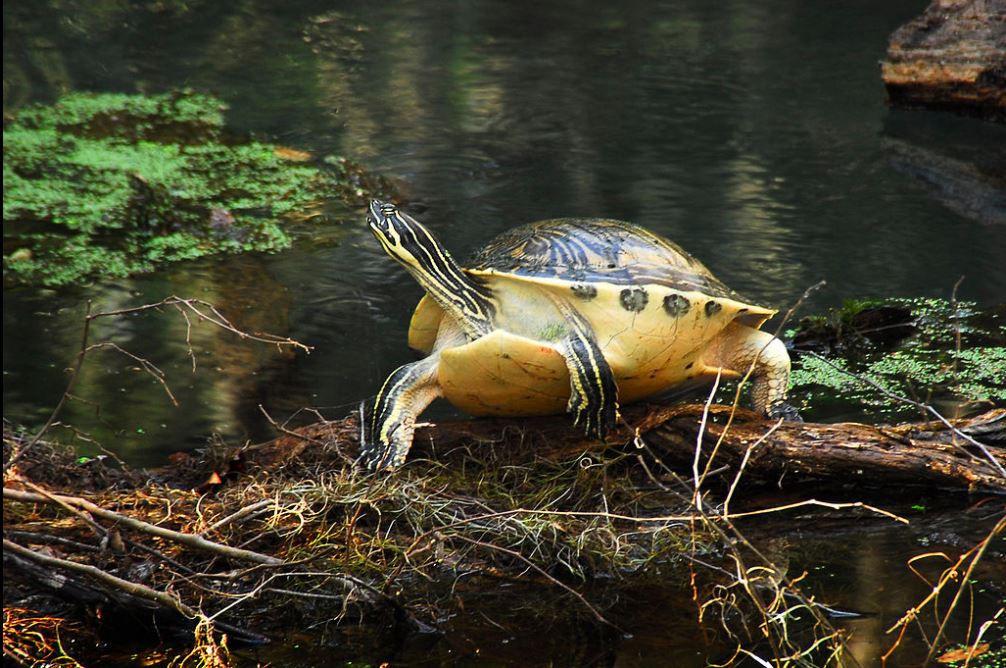MIAMI – In late November 2018, two turtles were found on Miami Beach swimming together frantically. Someone had drilled a hole into each of their shells and chained them together. Once rescued, they were taken to the Pelican Harbor Seabird Station for care. The two turtles were of different species, a red eared slider and a cooter. On Thursday, February 7, they released the cooter, a species native to Florida, back into the wild. The red eared slider is still undergoing treatment.
The metal chain that bound the turtles together also secured them to a bundle and two padlocks with keys. That bundle contained cinnamon sticks, two poppets of red cloth, and two photos of an unidentified mixed-gender couple. People immediately labeled the poppets as “voodoo dolls.”

Courtesy: Pelican Harbor Seabird Station
Turtle binding and Vodou
The Wild Hunt spoke with Sen Moise about this incident and Vodou. In Kreyol, Sen Moise means Saint Moses. Sen Moise is out of New Orleans and an Hougan Asogwe, High Priest, of Haitian Vodou. Sen Moise emphatically said turtle binding “is not [Haitian] Vodou, I can tell you that right now.” Followers of Haitian Vodou prefer on the spelling “Vodou.”
Sen Moise challenged the entire notion of “voodoo dolls.” The Hougan Asogwe continued, “In Haitian Vodou, we don’t use dolls like that at all. That’s not the way that it works in Haitian Vodou. The whole doll thing is something that is a product of the media. When you’re talking about working a doll baby, that’s not a Vodou thing that’s something that comes from somewhere else.”
The Hougan Asogwe hypothesized that it could be a ritual from some other African Traditional Religion. For example, despite their similar names, Haitian Vodou and New Orleans Vodou differ. Many different spiritual traditions make up African Traditional Religion.
Miami is rich with many Afro-Caribbean, African-American, and other spiritual communities. Sen Moise said “With Miami, there’s so many different spiritual systems and things that are going on down there. It could realistically be anything. People like to automatically talk about ‘voodoo,’ but they don’t know anything about it. They don’t understand what it is or what it isn’t.” The binding of the turtles may have been a ritual from some other African Traditional Religion, or someone utilizing some other unidentified form of occult practice unrelated to any tradition whatsoever. It is impossible to know.
Two other cases of chained turtles in Florida are known. In 2016, people found a pair of chained turtles in the Miami River. The 2016 incident lacked a bundle with its poppets, photos, and cinnamon sticks. In 2017, people found another pair in Central Florida. It is not known if the 2017 incident involved a bundle and its contents.
The Miami New Times contains a picture of the two turtles chained together, and a video shows the cooter being released back into a freshwater lake. The cooter spent 71 days in treatment, and an unknown number of days in saltwater.
The Hougan Asogwe expressed a great deal of contempt and anger for most material about Vodou on the Internet. Sen Moise cited “American Horror Story: Coven,” “American Horror Story: Apocalypse,” and “The Serpent and the Rainbow” as examples of disinformation and sensationalism. As an example of good information about Vodou, Sen Moise acknowledged the film “Divine Horsemen: The Living Gods of Haiti” by Maya Deren. Although filmed from 1947 to 1954, the film was only released in 1985. Sen Moise said “There was a lot of legitimacy.” Deren wrote a book “Divine Horsemen: The Voodoo Gods of Haiti” in 1953.
Sen Moise stressed three key things about Vodou. First, “Vodou is oriented to the family and the community.” Second, “Vodou is not evil like [they] make it out to be.” Third, “Vodou is about service to god and service to your spirit.”
The health of the turtles
The Wild Hunt recently spoke with Yaritza Acosta to learn about the health of these turtles. She works at Pelican Harbor Seabird Station as their Rehabilitation Manager. The Seabird Station treated these two turtles. They gave the turtles anti-biotics, and cleaned their shells on a daily basis.
Acosta said that the two turtles were freshwater turtles, but were found in saltwater. While saltwater turtles have the ability to filter out the salt that they breath in or drink, freshwater turtles lack that ability. She said that this inability led to the respiratory problems of the turtles.
Besides a respiratory problem, the cooter’s shell had begun to rot. Acosta was not sure what caused the shell to rot. Something could have caused it before they ended up in saltwater. It is also possible that exposure to salt water could have resulted in shell rot.
The red eared slider remains in treatment with respiratory problems, possibly pneumonia. Acosta stressed that turtles are slow healers. That slider has been in treatment for over 70 days.
The Pelican Harbor Seabird Station only treats species native to Florida. This policy created a problem when the two turtles of different species were brought in. One turtle, the juvenile male cooter, was a species native to Florida. The other, a red eared slider, was not native to Florida. The Seabird Station made an exception in this case and treated both turtles. They released the cooter into the wild at Amelia Earhart Park north of the Miami. When healed, the Seabird Station will give the non-native red eared slider to Miami Animal Rescue Mission. They will not release a non-native species into the wild.

By Josh215 [CC BY-SA 3.0; Wikimedia Commons]
Male_Muscovy Duck
Injured Muscovy Ducks
Acosta said that the Seabird Station has seen other animals with possible ritual related injuries. She said that they see injured Muscovy Ducks about once a month. These ducks or birds had ribbons or ropes tied to them. She said “if it’s [the ribbon] on their leg[s], it would hinder their walking. Sometimes it’s on their wings, where it’s hindering them from flying.” Acosta said that they see this about once a month. When asked, Sen Moise said “That is not something that we would do [in Haitian Vodou].”
The Wild Hunt is not responsible for links to external content.
To join a conversation on this post:
Visit our The Wild Hunt subreddit! Point your favorite browser to https://www.reddit.com/r/The_Wild_Hunt_News/, then click “JOIN”. Make sure to click the bell, too, to be notified of new articles posted to our subreddit.

